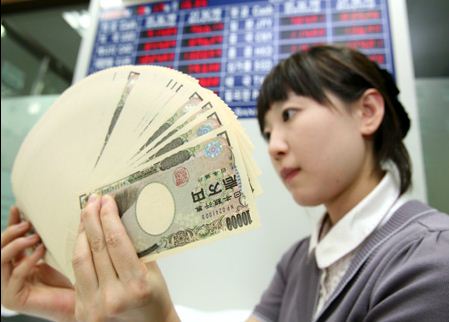(单词翻译:单击)
The yen has been losing value at a more rapid pace against the dollar since the Bank of Japan launched its latest round of quantitative easing a month ago, and was trading at more than Y118 to the greenback at last glance.
自一个月前日本央行(Bank of Japan)启动最新一轮量化宽松以来,日元兑美元汇率就一直在更加快速地下跌,在我写这篇文章时已跌至1美元兑118日元上方。

Monetary easing, the first arrow of Abenomics, has always been the most efficacious in Tokyo’s quiver. But its purpose is only partly about the central bank’s oft-voiced commitment to driving inflation up and ending a deflationary mindset, a mindset politicians insist is responsible for weak consumption and weak capital expenditure. That first arrow is about driving down the yen and stimulating exports. Everything else is more needles than arrows.
安倍经济学(Abenomics)射出的第一支箭是货币宽松,它一直是日本政府箭筒中最有杀伤力的一支。但履行日本央行经常申明的推升通胀和结束通缩思维(政治人士坚称这种思维导致了消费和资本支出疲软)的承诺,只是射出这支箭的部分原因。射出这第一支箭的主要目的,是要压低日元汇率和刺激出口。其他都是次要的。
That disguised cheap yen policy meant that in the third quarter, exports were up 5.3 per cent in a world where trade is stagnant and has been for a couple of years. That data point was the only healthy one in a dismal period – even by Japanese standards. Private consumption rose a meagre 1.5 per cent after an 18.6 per cent drop the previous quarter and capex was a negative 0.9 per cent after a 17.9 per cent plunge in the second quarter. In other words, in a period where GDP was also negative, trade accounted for a positive 0.4 per cent contribution to growth.
这一经过伪装的廉价日元政策的结果是,在近几年来世界贸易总额增长基本停滞的背景下,日本出口额在今年第三季度增长了5.3%。这一数据可谓是低迷时期唯一健康的数据,即使以日本的标准来衡量也是如此。私人消费仅增长1.5%,第二季度下滑18.6%;资本支出下滑0.9%,第二季度下滑17.9%。换句话说,在这段国内生产总值(GDP)增长也为负的时期,贸易为GDP增长贡献了正0.4个百分点。
The Japanese arrow has not gone unnoticed by competitors. In mid-November, the People’s Bank of China cut interest rates. In part that is because the cost of capital in China has been too high for many borrowers. But it is also because the Chinese currency has moved up 10 per cent from its lows of earlier this year. “The PBOC would not have moved as quickly as last Friday if it were not for Kamikaze Kuroda,” noted Chris Wood of the CLSA unit of Citic Securities. The Bank of Korea has already cut rates twice, most recently in October.
日本的竞争对手们并非没有注意到日本射出的这支箭。11月中旬,中国央行降息。此举的部分原因在于,对很多借款者而言,中国的资金成本太高。但还有部分原因在于,人民币汇率已较今年早些时候的低点上涨了10%。中信证券(Citic Securities)旗下里昂证券(CLSA)的分析师克里斯•伍德(Chris Wood)指出:“如果不是因为黑田东彦(Haruhiko Kuroda)表现得像神风特攻队那样,中国央行本不会在上周五就采取行动。”韩国央行(Bank of Korea)已两次降息,最近一次是在10月。
That suggests the world is entering a new phase where quantitative easing, once the tool of choice to stimulate ailing economies in the developed world, is going to be increasingly deployed in the emerging world. QE has become the latest – albeit apparently indirect – weapon in driving down currencies. Currency wars are especially intense when global trade is stagnant and one country’s gains come at the expense of rivals.
这表明,全球正进入一个新时期,曾是发达国家刺激乏力经济之利器的量化宽松政策,将越来越多地被新兴世界使用。量化宽松已成为压低汇率的(尽管表面上看是非直接的)最新武器。在全球贸易增长陷于停滞、一国的收益要靠竞争对手的损失来实现时,汇率大战就变得特别激烈。
“A sustained weakening in the yen will have regional consequences. The depreciation of the Korean won and Taiwan dollar will likely accelerate, making the regional backdrop resemble that in the quarters leading up to the Asian crisis in 1997,” warns Stephen Jen, of research boutique SLJ Macro in London.
伦敦小型研究机构SLJ Macro的任永力(Stephen Jen)警告称:“日元持续走低将对该地区产生影响。韩元和新台币很可能会加速贬值,这让该地区的局面类似于1997年亚洲金融危机爆发前的几个季度。”
China’s cut in particular caught economists by surprise. “Positive real rate differentials and continued current account surpluses in China only make it harder to engineer a sustained depreciation trend in the renminbi,” Morgan Stanley strategists warn. “In the scenario that the PBoC weakens forex as a policy tool, we would expect global disinflationary currents to come further to the fore.” These analysts add that currencies most vulnerable under that scenario include the euro, Swiss franc, yen, Singapore dollar and Thai baht. Meanwhile, the ECB is expected to commit to more unconventional monetary policy, which will probably cause the euro's value to decline. Remember that Germany competes directly with Japan in third markets, whether for the capital equipment that most manufacturers need for their own production or for luxury cars.
中国的降息尤其令经济学家感到意外。“中国的正实际利差和经常账户持续盈余只会让中国更难策动人民币持续贬值的趋势,”摩根士丹利(Morgan Stanley)的策略师警告称,“在中国央行降低汇率作为一种政策工具的份量的情况下,我们预计全球的通胀减缓趋势将进一步显现出来。”这些分析师补充称,在这种情况下,最为脆弱的货币包括欧元、瑞士法郎、日元、新加坡元以及泰铢。与此同时,预计欧洲央行(ECB)将致力于更加非常规的货币政策,这很可能会导致欧元贬值。请记住,德国是与日本在第三方市场展开直接竞争,不管是就资本设备(大多数制造商自身的生产都需要这类设备)还是就豪华汽车而言。
At the same time, the US dollar is now at a five-year high and again economists are lowering forecasts for growth in the US for the last quarter of the year (from 3 per cent to 2.3 per cent, in the case of Barclays). That underscores the fact that QE does not seem to do much to transform the pace of economic growth on either side of the Pacific.
与此同时,美元汇率正处于5年高位,经济学家正再次调降对今年最后一个季度美国经济增速的预期,例如巴克莱(Barclays)就从3%调降至2.3%。这突显出下列事实:量化宽松似乎并没有在很大程度上改变欧美的经济增速。
The resort to QE as the tactic of choice to drive down the value of a given currency is doubly sad because the combination of QE and low rates stimulates asset prices and financial engineering far more than capital spending and improvements in the real economy. It is fiscal stimulus that can contribute to growth in the real economy.
将量化宽松作为压低某一货币汇率的首选策略,真的很令人遗憾,因为量化宽松和低利率这一组合对资产价格和金融操作的刺激,远大于对资本支出和实体经济改善的提振。能对实体经济增长做出贡献的是财政刺激。


